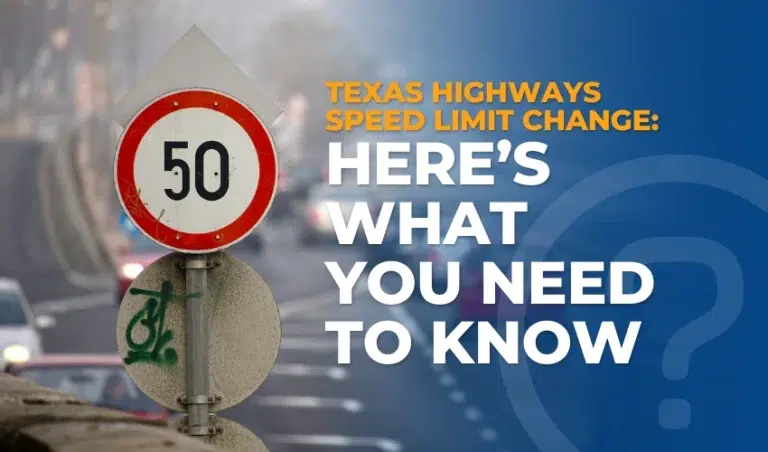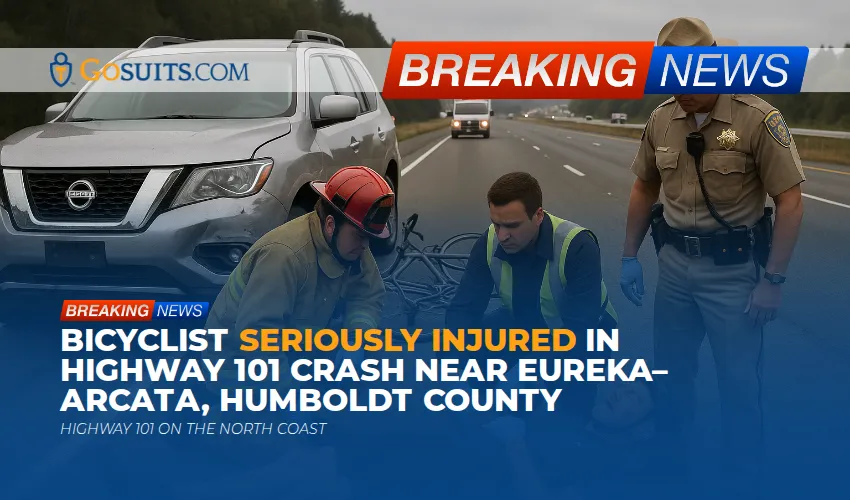South Texas Speed Limit Change
What used to be highways that bridges people and the community would now be one of the main causes of accidents in the state. Recently, several routes in southeast Texas are having their speed limits lowered due to state officials’ worries about safety. After conducting thorough speed zone assessments, the Texas Department of Transportation has decided to lower the speed limit in Texas on roads in Beaumont and Port Arthur by 5 to 10 mph. Jefferson and Orange counties are impacted by the affected roadways. Based on data from TxDOT, there were 6,360 collisions in Jefferson County last year, with 47 lives lost as a result. Thirteen people lost their lives in 1,640 accidents in Orange County.
It is important for all drivers to take note of the speed changes on the following areas:
- State Highway 347 in Beaumont from the Cardinal Drive split to Du Pont Road: 70 mph to 65 mph
- U.S. Highway 69 to state Highway 73, between Port Arthur and Beaumont: 75 mph to 70 mph
- I-10 from 9th street in Downtown Beaumont to the Neches River: 65 mph to 55 mph
- U.S. Highway 90 in Beaumont from Wescalder Road to Dowlen Road: 50 mph to 45 mph
- I-10 from Old Highway 90 to west Rose City: 75 mph to 70 mph
- State Highway 87 between west Port Arthur and Sabine Pass: 65 mph to 55 mph
Texas Highways
The state of Texas was responsible for twenty-five percent of the total highway construction in the United States in 1947. In order to better serve farmers and ranchers who had been neglected for a long time, the Highway Department started experimenting with enhancements such as hot topping, a procedure through which gravel or dirt roads are improved to handle heavy traffic and wet weather. Eventually, the paving of farm and ranch roads transformed country life in Texas, making it much simpler for people to attend school, connecting farms and ranches with town life, and blurring the borders between the country and the suburbs. In cases of accidents or injuries that may arise from these roads, seeking help from a personal injury attorney in Carrollton, TX can provide essential legal support and guidance for victims.
Brief overview of highway speed limits in Texas
View this post on Instagram
For a stretch of State Highway 130 that is 41 miles long and runs between State Highway 45 in Austin and Interstate 10 in Seguin, the state of Texas has the highest posted speed limit in the US, which is 85 miles per hour. According to Texas traffic code, the maximum speed limit is 70 miles per hour; however, the Texas Transportation Commission has the authority to raise it to 75, 80, or 85 miles per hour if the transportation department determines that the roadway is capable of safely accommodating the higher speed.
Importance of adhering to speed limits for safety
Studies have demonstrated that lowering the speed limit below what most drivers consider to be a fair pace does not substantially decrease the frequency of road accidents. Unreasonably low speed limits may actually increase the likelihood of collisions.
However, Adhering to speed limits is of utmost importance for maintaining road safety. Speed limits are set based on various factors such as road conditions, traffic density, and visibility, among others. By adhering to these limits, drivers can ensure a safer environment for themselves and others on the road. Exceeding speed limits not only increases the risk of accidents but also reduces the driver’s ability to react in time to unexpected situations. It should be noted that the Texas Department of Transportation’s aim is to provide speed limits that are of utmost safety for all drivers.

Connection between speed limits and personal injury
Car accidents are one of the main causes of death and disability globally, and one of the key elements that contribute to the severity of these accidents is speed. Scientists have shown time and time again that the risk of injury or death in a vehicle collision is directly proportional to the driver’s speed. In the case of an accident, the severity of injuries is directly proportional to the vehicle’s speed, which is probably not surprising to hear. However, how accurate is this correlation really?
The World Health Organization discovered that for every 5% increase in average speed, the number of injury accidents rises by 10% and the number of death wrecks by 20%. In a comparable way, the Insurance Institute for Highway Safety discovered that for every 5 mph increase in the posted maximum speed limit, there was an 8% spike in highway and interstate deaths and a 3% spike in all other road fatalities. This data can be crucial when dealing with legal cases, which is why a personal injury attorney plano tx can help victims navigate the complex legal processes after an accident. This integrates your keyword while maintaining the flow and meaning of the text.
Factors Affecting Personal Injury in Speeding-Related Accidents
There are several factors that can greatly affect the severity of personal injuries in speeding-related accidents. One of the most significant factors is the speed at which the vehicles involved are traveling. The higher the speed, the greater the force of impact, resulting in more severe injuries. The type of vehicle involved can also play a role in the extent of injuries. For example, larger and heavier vehicles such as trucks and SUVs tend to cause more damage and result in more serious injuries compared to smaller passenger cars.
Another important factor is the use of safety devices, such as seat belts and airbags. Properly fastened seat belts and functional airbags can greatly reduce the risk of severe injuries in speeding-related accidents. Furthermore, weather and road conditions can contribute to the severity of injuries, as slippery surfaces or poor visibility can make it more difficult for drivers to control their vehicles and increase the likelihood of accidents. At personal injury law firms frisco, we understand how these factors can influence the outcomes of accidents, and we are here to help victims seek the compensation they deserve.
Legal Considerations and Consequences
In Texas, overspeeding is not only dangerous but also comes with legal consequences. The state has specific laws and regulations in place to ensure road safety and hold drivers accountable for their actions. When caught overspeeding, drivers can face hefty fines, points on their driving records, and even license suspension. Insurance rates are likely to increase, making it more expensive for individuals to maintain coverage. In such cases, personal injury law firms in Frisco can provide essential legal assistance, helping drivers navigate the legal consequences and ensure their rights are protected. These legal considerations and consequences serve as a deterrent for drivers to engage in speeding behaviors and prioritize the safety of themselves and others on the road.
How Personal Injury Lawyers in Carrollton Can Help You After an Accident
If you’ve been involved in an accident in Carrollton due to someone else’s negligence, seeking legal representation from personal injury lawyers in Carrollton can make a significant difference in your recovery process. Personal injury lawyers specialize in helping victims who have suffered physical, emotional, and financial losses due to accidents caused by the carelessness of others. These lawyers understand the intricacies of Texas law and can guide you through the complexities of filing a personal injury claim. From gathering evidence, negotiating with insurance companies, to representing you in court if necessary, they will work tirelessly to ensure that you receive fair compensation for your medical bills, lost wages, pain, and suffering. Whether the accident involved a car, motorcycle, or even a slip and fall, personal injury lawyers in carrollton have the experience and knowledge needed to build a strong case on your behalf. Additionally, they work on a contingency fee basis, meaning you won’t have to pay any legal fees unless they successfully recover compensation for you. This allows victims to seek justice without worrying about upfront costs. Protect your rights by reaching out to an experienced personal injury lawyer in Carrollton today.
The general speed limit on highways in Texas is 75 miles per hour. However, in certain rural areas, the speed limit can be raised to 85 miles per hour.
Yes, there are exceptions to the general speed limits on Texas highways. For example, in school zones, the speed limit is typically reduced to 20 miles per hour during certain times of the day. Construction zones also often have reduced speed limits for the safety of workers and drivers.
The penalties for exceeding the speed limit in Texas can vary depending on the severity of the offense. Generally, a driver can expect to receive a fine for speeding, with the amount increasing for higher speeds. Additionally, excessive speeding can result in the accumulation of points on one’s driving record, which can lead to the suspension or revocation of a driver’s license. In some cases, particularly for extreme speeds or repeat offenses, a driver may also face the possibility of jail time.
Yes, speed limits can change during certain weather conditions in Texas. The Texas Department of Transportation may reduce speed limits during inclement weather such as heavy rain, fog, or snow to ensure the safety of drivers on the road. These reduced speed limits are typically indicated by electronic signs or temporary speed limit signs.
Yes, there are specific speed limits for trucks and other vehicles on Texas highways. In general, trucks are required to follow the same speed limits as other vehicles. However, there are certain areas where lower speed limits may be imposed for trucks, such as in construction zones or on certain stretches of road with steep grades. These lower speed limits are put in place to ensure the safety of both truck drivers and other motorists on the road. Certain vehicles, such as school buses or vehicles carrying hazardous materials, may be subject to lower speed limits as well.
It is generally legal to drive at the maximum speed limit posted on Texas highways, as long as road and weather conditions allow for safe driving. However, it is important to note that driving at the maximum speed limit does not guarantee safety, as drivers must still exercise caution and follow traffic laws. It is always recommended to drive at a speed that is safe and appropriate for the given circumstances.
Yes, you can contest a speeding ticket in Texas. If you believe you were wrongly ticketed or if you have evidence to prove your innocence, you can choose to fight the ticket in court. However, it is recommended to consult with a lawyer who specializes in traffic violations to understand your options and increase your chances of success.







